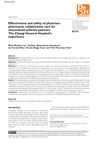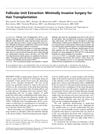
The study aims to create a model to improve personalized and preventive health care.
 January 2012 in “Elsevier eBooks”
January 2012 in “Elsevier eBooks” New treatments for skin and hair repair show promise, but further improvements are needed.
 December 1920 in “The Lancet”
December 1920 in “The Lancet” The document discusses various public health initiatives and societal issues, emphasizing early intervention and support.
26 citations,
August 2008 in “Clinical endocrinology” The document concludes that more multidisciplinary research is needed to understand and treat PCOS, a condition that significantly affects women's health and quality of life.
 10 citations,
January 2023 in “Journal of the European Academy of Dermatology and Venereology”
10 citations,
January 2023 in “Journal of the European Academy of Dermatology and Venereology” Alopecia areata greatly affects people's life quality, mental health, and work life.
 November 2023 in “Plastic and Reconstructive Surgery – Global Open”
November 2023 in “Plastic and Reconstructive Surgery – Global Open” Americans see hair transplants as valuable for treating hair loss and want them to be more affordable and tailored to each gender.

Peptide hydrogels show promise for healing skin, bone, and nerves but need improvement in stability and compatibility.
October 2024 in “Our Dermatology Online” Mitochondrial dysfunction links metabolic syndrome and inflammatory skin diseases, suggesting targeted therapies and lifestyle changes.
 April 2023 in “JMIR Research Protocols”
April 2023 in “JMIR Research Protocols” The study aims to create a model to predict health attributes using diverse health data from Japanese adults.
 6 citations,
June 2021 in “Journal of health psychology”
6 citations,
June 2021 in “Journal of health psychology” The article suggests that the view of male baldness as a medical issue is influenced by commercial bias and calls for more unbiased research.
 85 citations,
March 2002 in “Body & Society”
85 citations,
March 2002 in “Body & Society” The document concludes that cosmetic surgery is still mainly a practice for women and the gender gap in this field is expected to continue.
 45 citations,
September 2018 in “International Journal of Women's Dermatology”
45 citations,
September 2018 in “International Journal of Women's Dermatology” PRP shows promise for hair loss treatment, with three initial monthly injections and maintenance every 3-6 months.
 9 citations,
November 2018 in “Drug Discovery Today”
9 citations,
November 2018 in “Drug Discovery Today” Using skin stem cells and certain molecules might lead to scar-free skin healing.
 1 citations,
June 2023 in “Curēus”
1 citations,
June 2023 in “Curēus” PCOS affects nearly 25% of female medical and dental students, impacting their academic and social lives.
 January 2025 in “Medicina”
January 2025 in “Medicina” Advanced techniques and technologies can improve burn wound healing, but more research is needed.
 21 citations,
January 2006 in “Pediatrics”
21 citations,
January 2006 in “Pediatrics” Some diseases can improve the outcomes of other diseases, leading to new treatment possibilities.
 68 citations,
January 2022 in “International Journal of Molecular Sciences”
68 citations,
January 2022 in “International Journal of Molecular Sciences” PCOS management includes lifestyle changes and medications, with ongoing research into repurposed drugs for better treatment options.
 January 2018 in “Deleted Journal”
January 2018 in “Deleted Journal” Managing PCOS effectively requires focusing on psychological health, lifestyle changes, and medication.
 4 citations,
August 2001 in “Epilepsia”
4 citations,
August 2001 in “Epilepsia” Treating epilepsy is complex, requiring careful drug choice and patient adherence to manage seizures and side effects.
 1 citations,
July 1998 in “JAMA”
1 citations,
July 1998 in “JAMA” The book provides a historical view of abortion in the U.S., critiques the pro-choice movement, and recommends including abortion in medical education.
 66 citations,
December 2003 in “Endocrinology and Metabolism Clinics of North America”
66 citations,
December 2003 in “Endocrinology and Metabolism Clinics of North America” Doctors need to be better prepared to assess and treat obesity in patients.
 5 citations,
March 2017 in “Journal of Dermatology”
5 citations,
March 2017 in “Journal of Dermatology” Patients and doctors find current hair loss treatments unsatisfying and believe involving patients in decisions improves results.
 4 citations,
December 2009 in “Current Medical Research and Opinion”
4 citations,
December 2009 in “Current Medical Research and Opinion” Dermatologists are more comfortable and proactive in treating male pattern hair loss than primary care physicians.
 December 2023 in “Dermatology and therapy”
December 2023 in “Dermatology and therapy” Japanese patients and physicians often disagree on the severity of Alopecia Areata and treatment satisfaction, needing better communication and treatments.
 September 2010 in “European Urology Supplements”
September 2010 in “European Urology Supplements” The document does not confirm if radical prostatectomy is the best treatment for locally advanced prostate cancer.
 2 citations,
April 2019 in “Proceedings of Singapore Healthcare”
2 citations,
April 2019 in “Proceedings of Singapore Healthcare” Collaborative care between physicians and pharmacists improved medication management for rheumatoid arthritis without raising costs.
 January 2024 in “Pharmaceutical medicine”
January 2024 in “Pharmaceutical medicine” Most European physicians know the risks and safe use of Cyproterone acetate, but few remember receiving official safety communications.
 76 citations,
December 2009 in “Clinics in Dermatology”
76 citations,
December 2009 in “Clinics in Dermatology” Hormonal treatments can help with acne but are not the first choice due to side effects and the need for careful patient selection.
 153 citations,
August 2002 in “Dermatologic Surgery”
153 citations,
August 2002 in “Dermatologic Surgery” Follicular Unit Extraction (FUE) is a less invasive hair transplant method with minimal scarring, suitable for about 60% of patients, especially those needing fewer grafts and quicker recovery.
 4 citations,
September 2011 in “Expert Review of Dermatology”
4 citations,
September 2011 in “Expert Review of Dermatology” Various treatments exist for alopecia areata, but none are completely satisfactory; choice depends on age, disease extent, and preference.



























